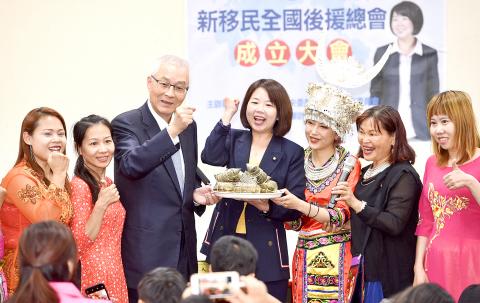Kaohsiung Mayor Han Kuo-yu’s (韓國瑜) policy advisory team yesterday proposed nine policies as part of the Chinese Nationalist Party (KMT) presidential candidate’s platform on new immigrants.
The proposals included lowering the number of years Chinese spouses must wait before they can obtain a national identification card from six to four; establishing a new-immigrant council under the Executive Yuan; building a national-level interpretation system; encouraging cooperation between multinational corporations and students who are children of new immigrants; developing new immigrants’ professional exam-related knowledge; providing an environment for learning Chinese and establishing a digitized learning platform; using the advantage of immigrants’ cultural diversity to nurture international talent; including pregnant new immigrants who are not covered by the national health insurance program in the program; and providing care services to immigrants arriving in Taiwan for the first time.
They proposals were announced by the team at a ceremony at the KMT’s headquarters in Taipei to mark the founding of Han’s national new-immigrant supporters’ club, which was also attended by KMT Chairman Wu Den-yih (吳敦義).

Photo: Peter Lo, Taipei Times
Wu said he hopes that everyone, regardless of their skin color, language or place of birth, can work together can create “one warm, big family.”
Over the past few years, many new foreign spouses have come to Taiwan, said former premier Simon Chang (張善政), the convener of Han’s policy advisory team.
There are now more than 550,000 new immigrants in Taiwan, he said.
There is a Council of Indigenous Peoples for the fewer than 570,000 Aborigines in Taiwan, he said, adding that a similar government agency should be created for new immigrants.
Meanwhile, Han attended the opening of his campaign headquarters in Penghu County.
Next year’s elections, on Jan. 11, “involve the survival or death of the Republic of China,” Han said, calling on voters to decide its future with their votes.
Additional reporting by Liu Yu-ching

A preclearance service to facilitate entry for people traveling to select airports in Japan would be available from Thursday next week to Feb. 25 at Taiwan Taoyuan International Airport, Taoyuan International Airport Corp (TIAC) said on Tuesday. The service was first made available to Taiwanese travelers throughout the winter vacation of 2024 and during the Lunar New Year holiday. In addition to flights to the Japanese cities of Hakodate, Asahikawa, Akita, Sendai, Niigata, Okayama, Takamatsu, Kumamoto and Kagoshima, the service would be available to travelers to Kobe and Oita. The service can be accessed by passengers of 15 flight routes operated by

Chinese spouse and influencer Guan Guan’s (關關) residency permit has been revoked for repeatedly posting pro-China videos that threaten national security, the National Immigration Agency confirmed today. Guan Guan has said many controversial statements in her videos posted to Douyin (抖音), including “the red flag will soon be painted all over Taiwan” and “Taiwan is an inseparable part of China,” and expressing hope for expedited reunification. The agency last year received multiple reports alleging that Guan Guan had advocated for armed reunification. After verifying the reports, the agency last month issued a notice requiring her to appear and explain her actions. Guan

GIVE AND TAKE: Blood demand continues to rise each year, while fewer young donors are available due to the nation’s falling birthrate, a doctor said Blood donors can redeem points earned from donations to obtain limited edition Formosan black bear travel mugs, the Kaohsiung Blood Center said yesterday, as it announced a goal of stocking 20,000 units of blood prior to the Lunar New Year. The last month of the lunar year is National Blood Donation Month, when local centers seek to stockpile blood for use during the Lunar New Year holiday. The blood demand in southern Taiwan — including Tainan and Kaohsiung, as well as Chiayi, Pingtung, Penghu and Taitung counties — is about 2,000 units per day, the center said. The donation campaign aims to boost

The Central Weather Administration (CWA) said a magnitude 4.9 earthquake that struck off the coast of eastern Taiwan yesterday was an independent event and part of a stress-adjustment process. The earthquake occurred at 4:47pm, with its epicenter at sea about 45.4km south of Yilan County Hall at a depth of 5.9km, the CWA said. The quake's intensity, which gauges the actual effects of a temblor, was highest in several townships in Yilan and neighboring Hualien County, where it measured 4 on Taiwan's seven-tier intensity scale, the CWA said. Lin Po-yu (林柏佑), a division chief at the CWA's Seismological Center, told a news conference